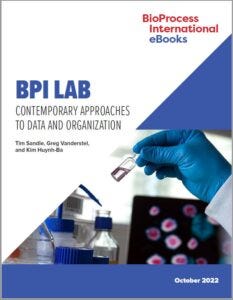eBook: BPI Lab — Contemporary Approaches to Data and OrganizationeBook: BPI Lab — Contemporary Approaches to Data and Organization
 Laboratories provide essential support functions in biopharmaceutical development: from cell-line development through process validation, environmental monitoring, and preclinical analyses . . . to product characterization, formulation, and stability testing. Regulatory compliance is important across the gamut of such laboratory work. Modern companies are implementing lean concepts that facilitate organization and workflows in laboratory operations. And companies around the world can use the latest technology to ensure data integrity for their analytical results. Included herein are two articles that originally appeared online in the open-source Journal of GXP Compliance. The authors highlight ways to improve laboratory functionality and data integrity.
Laboratories provide essential support functions in biopharmaceutical development: from cell-line development through process validation, environmental monitoring, and preclinical analyses . . . to product characterization, formulation, and stability testing. Regulatory compliance is important across the gamut of such laboratory work. Modern companies are implementing lean concepts that facilitate organization and workflows in laboratory operations. And companies around the world can use the latest technology to ensure data integrity for their analytical results. Included herein are two articles that originally appeared online in the open-source Journal of GXP Compliance. The authors highlight ways to improve laboratory functionality and data integrity.
First, Tim Sandle introduces the lean 5S concept and shows how to apply it to improving laboratory operations. He provides a case study from a microbiological laboratory project, with before and after photos. 5S can be used to address several areas of inefficiency: e.g., focus, organization, lead times, sample tracking and expediting, workload, computer systems, and training.
In the second article, Greg Vanderstel and Kim Huynh-Ba highlight a trend in warning letters citing data integrity, mostly contributed to methods of recording and evaluation of results. Good documentation practices (GDPs) require data integrity. Most inspections focus on accuracy and completeness rather than other criteria such as contemporaneity. But as the cornerstone of recording raw data generated in analytical laboratories, contemporaneous data can be overlooked, making problems with it undetectable. The authors explore global regulatory expectations and how contemporaneous recording can affect integrity of data.
Fill out the form below to read the eBook now.
You May Also Like






